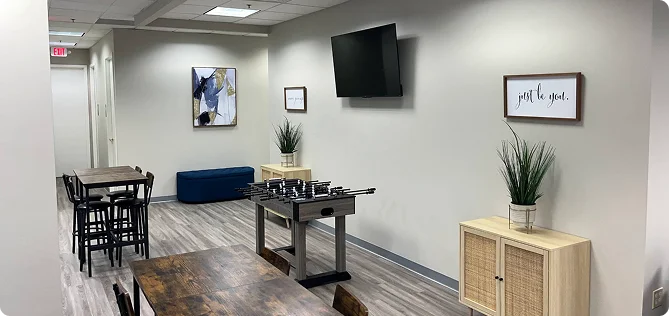Dialectical Behavior Therapy
in Massachusetts
At Refresh Recovery Center in Norwell, our DBT therapy helps you build real skills to use in your daily life. You’ll work with therapists who specialize in the unique challenges that come with addiction recovery and mental health.
What Is DBT Therapy?
Dialectical behavior therapy is a structured treatment that teaches you practical skills. Dr. Marsha Linehan invented DBT in the 1980s because regular therapy wasn’t effective for people with severe emotional problems. Today, it works for addiction, anxiety, depression, and other issues. It teaches you to accept difficult feelings and how to change unhealthy habits. You can manage intense emotions better, stop risky choices, and mend relationships.
Who Benefits From DBT?
Dialectical behavior therapy helps adults who experience:
- Cravings you can’t control
- Intense feelings that overwhelm you
- Stress that feels too difficult to handle
- Mood swings that come out of nowhere
- Anxiety, depression, PTSD, or BPD traits
- Daily routines that feel completely messed up
- Need for better coping skills to prevent relapse
DBT Techniques You'll Learn
- Mindfulness to identify what you're thinking and feeling without judgment
- Emotion regulation to name emotions and regulate your response
- Distress tolerance to get through tough moments without regrets
- Interpersonal effectiveness to set limits and rebuild relationships

Outpatient DBT Groups in Massachusetts
You’ll experience DBT skills groups in addition to one-on-one therapy that helps you track your progress. Group therapy sessions let you practice with other people who understand what you’re going through.
Program Options at Refresh Recovery
Day Treatment
This full-day program involves group therapy, solo sessions, medication help, and other support. It provides structured day programs without on-site stays.
Half-Day Treatment
The part-day program meets 3–5 days a week. This is ideal for those with work, school, or family responsibilities while receiving intensive treatment.
Outpatient and Aftercare
Weekly outpatient treatment and support groups help after you finish higher levels of treatment. You’ll use your DBT skills when day-to-day problems occur.
Why Choose Refresh Recovery Center
Licensed Therapists
Our staff is knowledgeable about various ways to assist. Each member is trained in DBT, CBT, MI, and trauma care.
We Treat Dual Diagnoses
You’ll get care for both addiction and mental health problems in tandem. There is no need to visit different centers.
Holistic Methods and Support
We guide sessions that target whole-person healing, such as meditation, yoga, art, and family involvement.
Fast Benefits Check With Clear Next Steps
With our admissions team, you’ll learn about your insurance coverage and know what to expect before starting.
DBT vs. CBT: What's the Difference?
CBT, or cognitive-behavioral therapy, works on changing negative thought patterns and habits. Dialectical behavior therapy does that too, but it also incorporates options to handle overwhelming emotions and some crises. It’s about accepting feelings and changing what you do.
CBT says, “Think differently about this.” Dialectical behavior therapy encourages you to accept what you feel in the moment and still make a positive choice. Many use both methods while in recovery as they complement each other.
Areas We Serve
Our Norwell office serves the South Shore and nearby towns. If you need DBT therapy near Cohasset, Hingham, Hanover, Hull, Pembroke, or Scituate, we’re close by. We also provide support for people from Greater Boston.

Success Stories
Maria Dimakis
They have formed a 5 star team to make your experience seamless. They utilized their life experiences to build a solid platform to give their clients the best opportunity to succeed.
Andrew Kolb
I have been a client at Refresh Recovery since February, and I can honestly say this program has been a game-changer for me. From the moment I walked through the doors, I was met with warmth, understanding, and zero judgment.
Veronica Cashin
I had the most incredible experience at Refresh Recovery. The team there is absolutely amazing, going above and beyond to provide exceptional care and support.
Michael Ashe
Great curriculum! The staff is very knowledgeable and individually meets every clients needs to ensure the best overall chances of recovery. Very high success rate! Would highly recommend!
Disclaimer: Customer reviews may be paraphrased for clarity and brevity.
We Accept Most Insurance
Reach out to our admissions team to verify your insurance for treatment at our facility.
Start Your Recovery Today
You don’t have to start your dialectical behavior therapy without support. With our team’s guidance, you can learn to manage intense emotions and addiction. Our DBT program can help you build the skills you need to create an enriching life.
FAQs
How long does DBT take?
Most people take part in DBT therapy for a few weeks or up to several months. Duration depends on your goals and how fast you pick up the skills. Your therapist will make a personalized plan with you.
Do you offer DBT skills groups?
Yes. Skills groups happen with our outpatient programs. You’ll meet other people working on the same healing that you are.
Is DBT helpful for addiction?
Yes. Dialectical behavior therapy teaches you how to cope without using drugs or alcohol. You’ll handle triggers and unhealthy feelings in safer, sustainable ways.
Can I work while in treatment?
Many people work during Half-Day Treatment. Day Treatment takes more time and gives you more support, while still allowing you to return home in the evenings.
Do you accept insurance?
Most insurance providers cover treatment that’s medically necessary. We’ll check your benefits right away and tell you about any costs.
Is DBT only for borderline personality disorder?
No. Dialectical behavior therapy started as a treatment for BPD. It now helps with anxiety, depression, PTSD, addiction, and more.
What happens after I finish the program?
You’ll receive a tailored aftercare plan. This can include ongoing therapy, support groups, and community resources. Recovery keeps going after treatment ends, and we help you stay connected.
